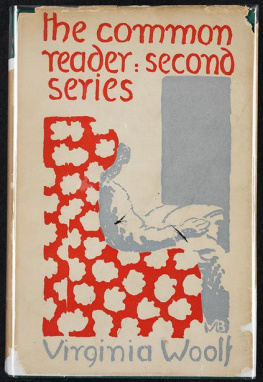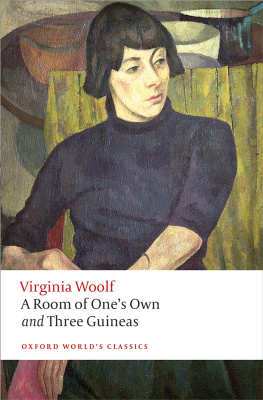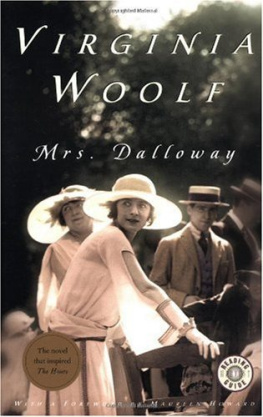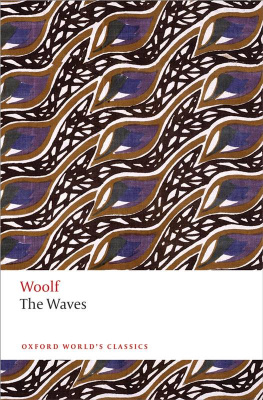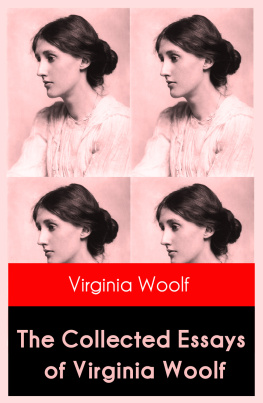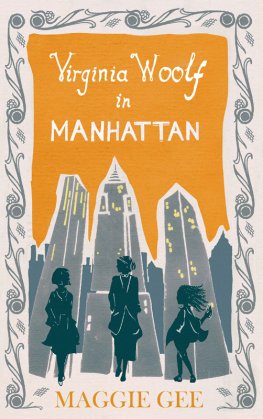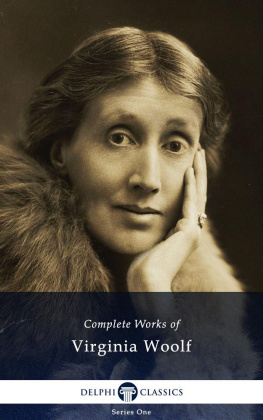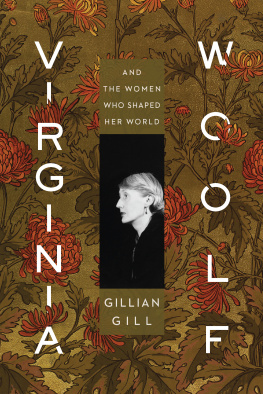Virginia Woolf - The Common Reader, Second Series
Here you can read online Virginia Woolf - The Common Reader, Second Series full text of the book (entire story) in english for free. Download pdf and epub, get meaning, cover and reviews about this ebook. year: 2010, genre: Science. Description of the work, (preface) as well as reviews are available. Best literature library LitArk.com created for fans of good reading and offers a wide selection of genres:
Romance novel
Science fiction
Adventure
Detective
Science
History
Home and family
Prose
Art
Politics
Computer
Non-fiction
Religion
Business
Children
Humor
Choose a favorite category and find really read worthwhile books. Enjoy immersion in the world of imagination, feel the emotions of the characters or learn something new for yourself, make an fascinating discovery.
- Book:The Common Reader, Second Series
- Author:
- Genre:
- Year:2010
- Rating:3 / 5
- Favourites:Add to favourites
- Your mark:
- 60
- 1
- 2
- 3
- 4
- 5
The Common Reader, Second Series: summary, description and annotation
We offer to read an annotation, description, summary or preface (depends on what the author of the book "The Common Reader, Second Series" wrote himself). If you haven't found the necessary information about the book — write in the comments, we will try to find it.
The Common Reader, Second Series — read online for free the complete book (whole text) full work
Below is the text of the book, divided by pages. System saving the place of the last page read, allows you to conveniently read the book "The Common Reader, Second Series" online for free, without having to search again every time where you left off. Put a bookmark, and you can go to the page where you finished reading at any time.
Font size:
Interval:
Bookmark:
The Common Reader, Second Series
Virginia Woolf
eBooks@Adelaide
2004
Table of Contents
This web edition published by eBooks@Adelaide .
Rendered into HTML on Tuesday June 01 2004, by Steve Thomas .
For offline reading, the complete set of pages is available for download from http://etext.library.adelaide.edu.au/w/woolf/virginia/w91c2/w91c2.zip
The complete work is also available as a single file, at
A MARC21 Catalogue record for this edition can be downloaded from
eBooks@Adelaide
The University of Adelaide Library
University of Adelaide
South Australia 5005
Virginia Woolf
The Common Reader, Second Series
... I rejoice to concur with the common reader; for by the common sense of readers, uncorrupted by literary prejudices, after all the refinements of subtilty and the dogmatism of learning, must be generally decided all claim to poetical honours.DR. JOHNSON, Life of Gray,
Most of the following papers have appeared in the Times Literary Supplement, Life and Letters, The Nation, Vogue, The New York Herald, The Yale Review, and Figaro. For permission to reprint two of them I have to thank the Oxford University Press and Mr. Jonathan Cape. Some are now published for the first time.
| |
Last updated on Fri Jun 4 10:55:54 2004 for eBooks@Adelaide .
Virginia Woolf
The Common Reader, Second Series
THE STRANGE ELIZABETHANS
There are few greater delights than to go back three or four hundred years and become in fancy at least an Elizabethan. That such fancies are only fancies, that this becoming an Elizabethan, this reading sixteenth-century writing as currently and certainly as we read our own is an illusion, is no doubt true. Very likely the Elizabethans would find our pronunciation of their language unintelligible; our fancy picture of what it pleases us to call Elizabethan life would rouse their ribald merriment. Still, the instinct that drives us to them is so strong and the freshness and vigour that blow through their pages are so sweet that we willingly run the risk of being laughed at, of being ridiculous.
And if we ask why we go further astray in this particular region of English literature than in any other, the answer is no doubt that Elizabethan prose, for all its beauty and bounty, was a very imperfect medium. It was almost incapable of fulfilling one of the offices of prose which is to make people talk, simply and naturally, about ordinary things. In an age of utilitarian prose like our own, we know exactly how people spend the hours between breakfast and bed, how they behave when they are neither one thing nor the other, neither angry nor loving, neither happy nor miserable. Poetry ignores these slighter shades; the social student can pick up hardly any facts about daily life from Shakespeares plays; and if prose refuses to enlighten us, then one avenue of approach to the men and women of another age is blocked. Elizabethan prose, still scarcely separated off from the body of its poetry, could speak magnificently, of course, about the great themeshow life is short, and death certain; how spring is lovely, and winter horridperhaps, indeed, the lavish and towering periods that it raises above these simple platitudes are due to the fact that it has not cheapened itself upon trifles. But the price it pays for this soaring splendour is to be found in its awkwardness when it comes to earthwhen Lady Sidney, for example, finding herself cold at nights, has to solicit the Lord Chamberlain for a better bedroom at Court. Then any housemaid of her own age could put her case more simply and with greater force. Thus, if we go to the Elizabethan prose-writers to solidify the splendid world of Elizabethan poetry as we should go now to our biographers, novelists, and journalists to solidify the world of Pope, of Tennyson, of Conrad, we are perpetually baffled and driven from our quest. What, we ask, was the life of an ordinary man or woman in the time of Shakespeare? Even the familiar letters of the time give us little help. Sir Henry Wotton is pompous and ornate and keeps us stiffly at arms length. Their histories resound with drums and trumpets. Their broadsheets reverberate with meditations upon death and reflections upon the immortality of the soul. Our best chance of finding them off their guard and so becoming at ease with them is to seek one of those unambitious men who haunt the outskirts of famous gatherings, listening, observing, sometimes taking a note in a book. But they are difficult to find. Gabriel Harvey perhaps, the friend of Spenser and of Sidney, might have fulfilled that function. Unfortunately the values of the time persuaded him that to write about rhetoric, to write about Thomas Smith, to write about Queen Elizabeth in Latin, was better worth doing than to record the table talk of Spenser and Sir Philip Sidney. But he possessed to some extent the modern instinct for preserving trifles, for keeping copies of letters, and for making notes of ideas that struck him in the margins of books. If we rummage among these fragments we shall, at any rate, leave the highroad and perhaps hear some roar of laughter from a tavern door, where poets are drinking; or meet humble people going about their milking and their love-making without a thought that this is the great Elizabethan age, or that Shakespeare is at this moment strolling down the Strand and might tell one, if one plucked him by the sleeve, to whom he wrote the sonnets, and what he meant by Hamlet.
The first person whom we meet is indeed a milkmaidGabriel Harveys sister Mercy. In the winter of 1574 she was milking in the fields near Saffron Walden accompanied by an old woman, when a man approached her and offered her cakes and malmsey wine. When they had eaten and drunk in a wood and the old woman had wandered off to pick up sticks, the man proceeded to explain his business. He came from Lord Surrey, a youth of about Mercys own age seventeen or eighteen that isand a married man. He had been bowling one day and had seen the milkmaid; her hat had blown off and she had somewhat changed her colour. In short, Lord Surrey had fallen passionately in love with her; and sent her by the same man gloves, a silk girdle, and an enamel posy ring which he had torn from his own hat though his Aunt, Lady W, had given it him for a very different purpose. Mercy at first stood her ground. She was a poor milkmaid, and he was a noble gentleman. But at last she agreed to meet him at her house in the village. Thus, one very misty, foggy night just before Christmas, Lord Surrey and his servant came to Saffron Walden. They peered in at the malthouse, but saw only her mother and sisters; they peeped in at the parlour, but only her brothers were there. Mercy herself was not to be seen; and well mired and wearied for their labour, there was nothing for it but to ride back home again. Finally, after further parleys, Mercy agreed to meet Lord Surrey in a neighbours house alone at midnight. She found him in the little parlour in his doublet and hose, his points untrust, and his shirt lying round about him. He tried to force her on to the bed; but she cried out, and the good wife, as had been agreed between them, rapped on the door and said she was sent for. Thwarted, enraged, Lord Surrey cursed and swore, God confound me, God confound me, and by way of lure emptied his pockets of all the money in themthirteen shillings in shillings and testers it came toand made her finger it. Still, however, Mercy made off, untouched, on condition that she would come again on Christmas eve. But when Christmas eve dawned she was up betimes and had put seven miles between her and Saffron Walden by six in the morning, though it snowed and rained so that the floods were out, and P., the servant, coming later to the place of assignation, had to pick his way through the water in pattens. So Christmas passed. And a week later, in the very nick of time to save her honour, the whole story very strangely was discovered and brought to an end. On New Years Eve her brother Gabriel, the young fellow of Pembroke Hall, was riding back to Cambridge when he came up with a simple countryman whom he had met at his fathers house. They rode on together, and after some country gossip, the man said that he had a letter for Gabriel in his pocket. Indeed, it was addressed To my loving brother Mr. G. H., but when Gabriel opened it there on the road, he found that the address was a lie. It was not from his sister Mercy, but to his sister Mercy. Mine Own Sweet Mercy, it began; and it was signed Thine more than ever his own Phil. Gabriel could hardly control himselfcould scarcely dissemble my sudden fancies and comprimitt my inward passionsas he read. For it was not merely a love-letter; it was more; it talked about possessing Mercy according to promise. There was also a fair English noble wrapped up in the paper. So Gabriel, doing his best to control himself before the countryman, gave him back the letter and the coin and told him to deliver them both to his sister at Saffron Walden with this message: To look ere she leap. She may pick out the English of it herself. He rode on to Cambridge; he wrote a long letter to the young lord, informing him with ambiguous courtesy that the game was up. The sister of Gabriel Harvey was not to be the mistress of a married nobleman. Rather she was to be a maid, diligent, and trusty and tractable, in the house of Lady Smith at Audley End. Thus Mercys romance breaks off; the clouds descend again; and we no longer see the milkmaid, the old woman, the treacherous serving man who came with malmsey and cakes and rings and ribbons to tempt a poor girls honour while she milked her cows.
Next pageFont size:
Interval:
Bookmark:
Similar books «The Common Reader, Second Series»
Look at similar books to The Common Reader, Second Series. We have selected literature similar in name and meaning in the hope of providing readers with more options to find new, interesting, not yet read works.
Discussion, reviews of the book The Common Reader, Second Series and just readers' own opinions. Leave your comments, write what you think about the work, its meaning or the main characters. Specify what exactly you liked and what you didn't like, and why you think so.

